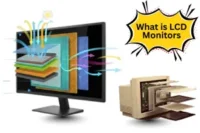How to Define Supercomputer – Big Power Big Impact
Published: 20 Jun 2025
Imagine your home computer as a bicycle useful for short rides and everyday tasks. Now, picture a supercomputer as a rocket built for speed, power, and massive missions. While regular computers can help you watch videos or write homework, a supercomputer can predict earthquakes, discover new planets, or help doctors find cures.
This powerful machine is not just fast, it’s a world changing tool that goes far beyond what normal computers can ever do. Here are define supercomputer in complete details lets start it.
What is a Supercomputer?
A supercomputer is a very fast and powerful computer. It can solve big problems much faster than regular computers. Scientists use supercomputers to study weather, space, and medicine. They have many processors working together and need special cooling because they get very hot. Supercomputers help us do things normal computers cannot.
Parts of Supercomputers?
A supercomputer is made up of many important parts that help it work very fast. Each part has a special job to do. Together, these parts make the supercomputer powerful and smart.
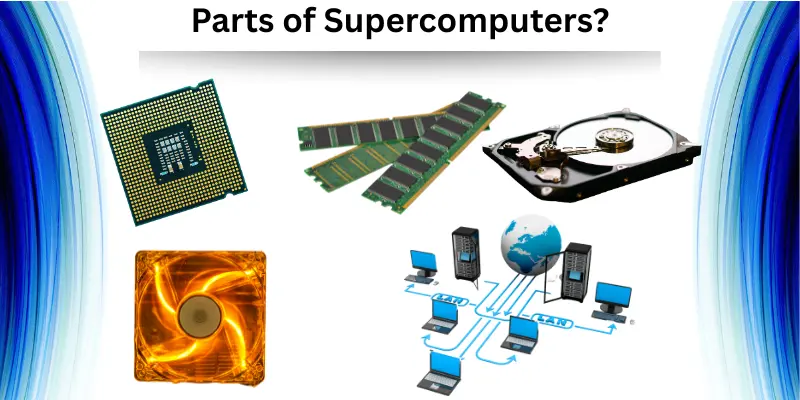
Main Parts of a Supercomputer
- Processors
- Memory
- Storage
- Cooling System
- Network
1. Processors
These are the brains of the supercomputer. Many processors work together to solve big problems quickly.
2. Memory
Memory holds the data and information the supercomputer uses while working.
3. Storage
This is where all data and programs are saved for later use.
4. Cooling System
Supercomputers get very hot, so cooling systems keep them cool and safe.
5. Network
The network connects all parts so they can share information fast and work as a team.
Most Useful Links
- https://ecscience.net/what-is-embedded-computer/
- https://ecscience.net/define-server-computer/
- https://ecscience.net/types-of-computers/
- https://ecscience.net/parts-of-computer/
Uses of Supercomputer
Supercomputers are very powerful machines that help solve big problems quickly. They are used in many important areas to make our lives better. Scientists and experts use supercomputers to understand things that normal computers cannot handle.
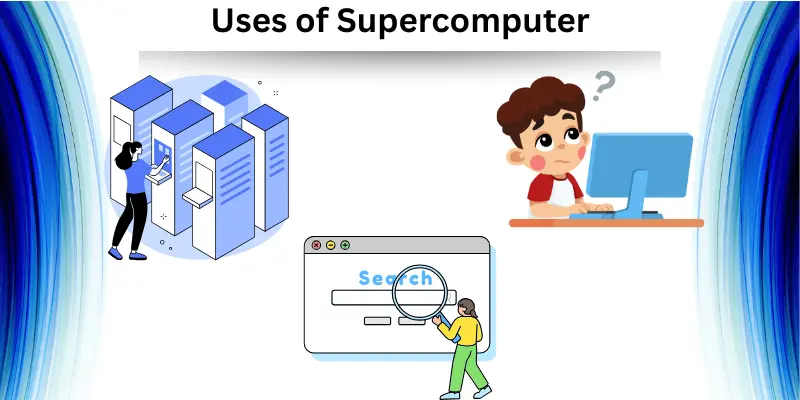
Here are some Uses of a Supercomputer
- Weather forecasting and storm prediction
- Space exploration and research
- Medical research and finding new medicines
- Simulating big engineering projects like airplanes and cars
- Studying climate change and natural disasters
- Helping with scientific experiments and data analysis
- Creating detailed animations and special effects in movies
Examples of Supercomputers
Supercomputers are built by many countries to solve big problems fast. These machines help scientists, researchers, and engineers do important work. Some supercomputers are famous because of their speed and the amazing things they can do.
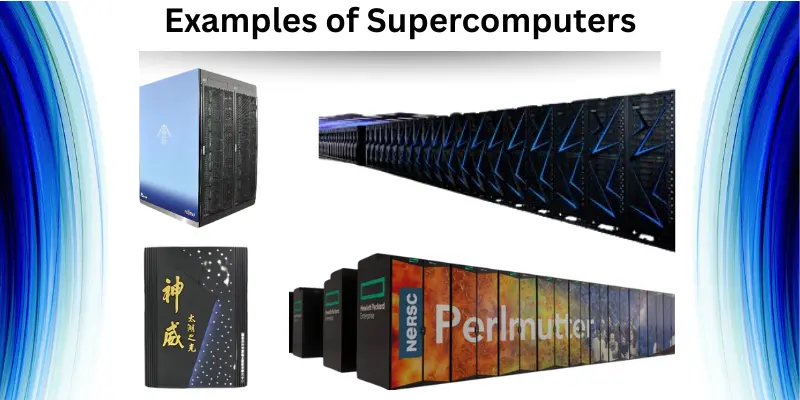
Here are Famous Supercomputers is include:
- Fugaku (Japan) One of the fastest supercomputers in the world.
- Summit (USA) Used for scientific research and weather prediction.
- Sierra (USA) Helps with national security and science.
- Sunway TaihuLight (China) Known for its incredible speed.
- Perlmutter (USA) Used for climate and physics research.
Types of Supercomputers
Supercomputers come in different types based on how they are built and what they do best. Each type is designed to solve special kinds of problems very fast. Understanding these types helps us know how supercomputers work in different fields.
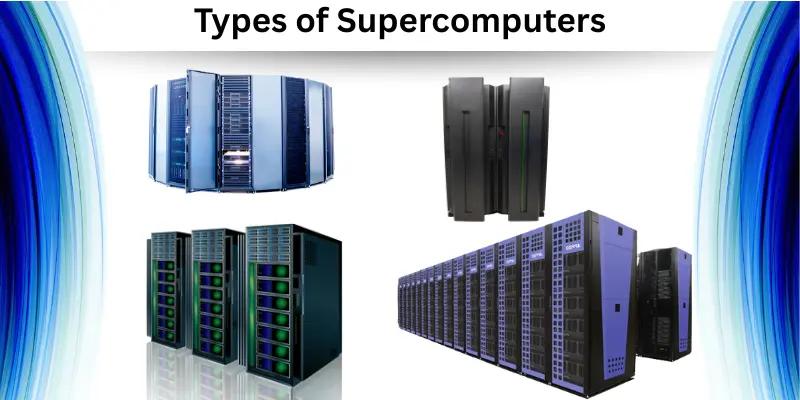
Here are Common Types of Supercomputers:
- Vector Supercomputers:
- Parallel Supercomputers:
- Cluster Supercomputers:
- Grid Supercomputers:
Explore are these supercomputers types
- Vector Supercomputers: Use a special method to handle many numbers at once.
- Parallel Supercomputers: Use many processors working together to solve big problems.
- Cluster Supercomputers: Connect many small computers to work like one big supercomputer.
- Grid Supercomputers: Use computers from different places connected through the internet to work together.
Most Useful Links
- https://ecscience.net/what-is-a-computer/
- https://ecscience.net/input-and-output-devices/
- https://ecscience.net/types-computer-memory/
- https://ecscience.net/what-is-cpu-in-computer/
Advantages and Disadvantages of Supercomputers
Supercomputers are very powerful and help solve big problems fast. But like any machine, they have both good points and some challenges. Knowing their advantages and disadvantages helps us understand how they work and where they are best used.
| Advantages of Supercomputers |
|---|
|
- Very expensive to build and maintain
- Use a lot of electricity
- Need special cooling systems to avoid overheating
- Too big and not for everyday use
FAQs About Define Supercomputers
Supercomputers are powerful machines that help us solve big problems quickly. Here are some common questions people ask about them:
A supercomputer is a very fast and strong computer used to do big and hard tasks quickly.
Scientists, space agencies, weather experts, and doctors use supercomputers.
They use thousands of small processors at the same time to work faster.
No, supercomputers are too big and costly. They are only in special places.
It can predict weather, find new medicines, study space, and much more.
Yes! Even if we don’t see them, they help improve health, safety, and science.
Yes, they get very hot, so they need strong cooling systems.
A supercomputer can be as big as a room or even bigger!
Conclusion
Supercomputers are amazing machines that help us solve big problems very fast. They are used in science, space, medicine, weather, and many other important areas. Even though we don’t use them at home, their work makes our world smarter, safer, and better.
Supercomputers show us how powerful technology can be when it’s used for good.
Most Useful Links
- https://ecscience.net/personal-computer/
- https://ecscience.net/define-supercomputer/
- https://ecscience.net/mainframe-computers/
- https://ecscience.net/define-minicomputer/
- https://ecscience.net/input-and-output-devices/




